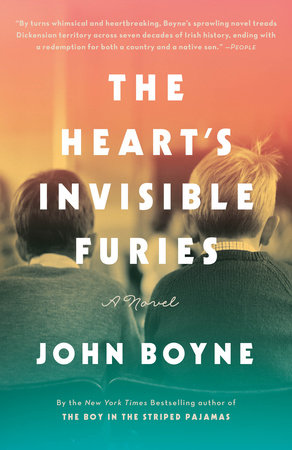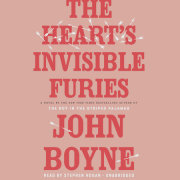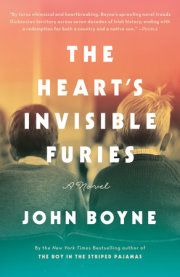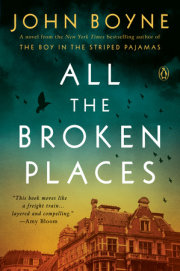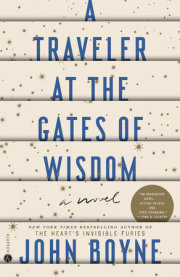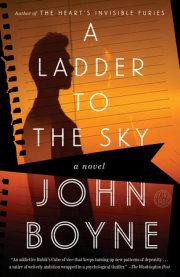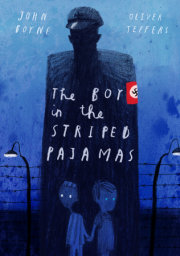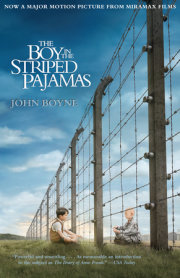Part I
SHAME
1945 The Cuckoo in the Nest
The Good People of Goleen
Long before we discovered that he had fathered two children by two different women, one in Drimoleague and one in Clonakilty, Father James Monroe stood on the altar of the Church of Our Lady, Star of the Sea, in the parish of Goleen, West Cork, and denounced my mother as a whore.
The family was seated together in the second pew, my grandfather on the aisle using his handkerchief to polish the bronze plaque engraved to the memory of his parents that was nailed to the back of the woodwork before him. He wore his Sunday suit, pressed the night before by my grandmother, who twisted her jasper rosary beads around her crooked fingers and moved her lips silently until he placed his hand atop hers and ordered her to be still. My six uncles, their dark hair glistening with rose--scented lacquer, sat next to her in ascending order of age and stupidity. Each was an inch shorter than the next and the disparity showed from behind. The boys did their best to stay awake that morning; there had been a dance the night before in Skull and they’d come home moldy with the drink, sleeping only a few hours before being roused by their father for Mass.
At the end of the row, beneath a wooden carving of the tenth station of the cross, sat my mother, her stomach fluttering in terror at what was to come. She hardly dared to look up.
The Mass began in the typical fashion, she told me, with the priest’s wearied discharge of the Introductory Rites and the congregation’s discordant singing of the Kyrie. William Finney, a neighbor of my mother’s from Ballydevlin, made his way in all his pomposity to the pulpit for the first and second liturgical readings, clearing his throat into the heart of the microphone before pronouncing every word with such dramatic intensity that he might have been performing on the stage of the Abbey Theater. Father Monroe, perspiring noticeably under the weight of his vestments and the intensity of his anger, followed with the Acclamation and the Gospel before inviting everyone to be seated, and three red--cheeked altar boys scurried to their side--bench, exchanging excited glances. Perhaps they had read the priest’s notes in the sacristy beforehand or overheard him rehearse his words as he pulled the cassock down over his head. Or maybe they just knew how much cruelty the man was capable of and were happy that on this occasion it was not being directed toward them.
“My family are all Goleen as far back as records go,” he began, looking out at one hundred and fifty raised heads and a single bowed one. “I heard a terrible rumor once that my great--grandfather had family in Bantry but I never saw any evidence to justify it.” An appreciative laugh from the congregation; a bit of local bigotry never hurt anyone. “My mother,” he continued, “a good woman, loved this parish. She went to her grave having never left a few square miles of West Cork and didn’t regret it for a moment. Good people live here, she always told me. Good, honest, Catholic people. And do you know something, I never had cause to doubt her. Until today.”
There was a ripple around the church.
“Until today,” repeated Father Monroe slowly, shaking his head in sorrow. “Is Catherine Goggin in attendance this morning?” He looked around as if he had no idea where he might find her, even though she had been seated in the same pew every Sunday morning for the past sixteen years. In a moment, the head of every man, woman and child present turned in her direction. Every head, that is, except for those of my grandfather and six uncles, who stared resolutely forward, and my grandmother, who lowered hers now just as my mother raised her own in a see--saw of shame.
“Catherine Goggin, there you are,” said the priest, smiling at her and beckoning her forward. “Come on up here to me now like a good girl.”
My mother stood up slowly and made her way toward the altar, a place she had only ever been before to take Communion. Her face was not scarlet, she would tell me years later, but pale. The church was hot that day, hot with the sticky summer and the breath of excited parishioners, and she felt unsteady on her feet, worrying that she might faint and be left on the marble floor to wither and rot as an example to other girls her age. She glanced at Father Monroe nervously, meeting his rancorous eyes for only a moment before turning away.
“As if butter wouldn’t melt,” said Father Monroe, looking out at his flock and offering a half--smile. “How old are you now, Catherine?” he asked.
“Sixteen, Father,” said my mother.
“Say it louder. So the good people at the back of the church can hear you.”
“Sixteen, Father.”
“Sixteen. Now lift your head and look out at your neighbors. At your own mother and father who have lived decent, Christian lives and been credits to the parents who went before them. At your brothers, whom we all know to be fine upstanding young men, hard workers who have led no girl astray. Do you see them, Catherine Goggin?”
“I do, Father.”
“If I have to tell you to speak up again, I’ll hit you a slap across this altar and there’s not a soul in the church that would blame me for it.”
“I do, Father,” she repeated, louder now.
“ ‘I do.’ That will be the only time you ever utter those words in a church, do you realize that, little girl? There’ll never be a wedding day for you. Your hands are going to your fat belly, I see. Is there a secret that you’re hiding?”
A gasp from the pews now. This was what the congregation had suspected, of course—-what else could it have been?—-but they had waited for confirmation. Eyes flitted back and forth between friends and enemies alike, conversations already being prepared in their heads. The Goggins, they would say. I would expect nothing less from that family. He can barely write his name on a scrap of paper and she’s a peculiar article.
“I don’t know, Father,” said my mother.
“You don’t know. Of course you don’t know. Sure aren’t you just an ignorant wee slut who has no more sense than a rabbit in a hutch? And the morals to match, I might add. All you young girls out there,” he said now, raising his voice as he turned to look out at the people of Goleen, who sat still in their seats as he pointed at them. “All you young girls are to take a look at Catherine Goggin here and learn what happens to girls who play fast and loose with their virtue. They find themselves with a child in their belly and no husband to take care of them.”
A roar went around the church. There had been a girl who got herself pregnant on Sherkin Island the previous year. It was a wonderful scandal. The same had happened in Skibbereen the Christmas before last. Was Goleen to earn the same mark of shame? If so, the news would be all around West Cork by teatime.
“Now, Catherine Goggin,” continued Father Monroe, placing a hand on her shoulder and squeezing the bone tightly between his fingers. “Before God and your family and all the good people of this parish, you’re to name the pup who lay down with you. You’re to name him now so he can be made to give his confession and be forgiven in the eyes of the Lord. And after that you’re to get out of this church and this parish and blacken the name of Goleen no more, do you hear me?”
She looked up and turned to my grandfather, whose face was set like granite as he stared at the statue of the crucified Jesus hanging behind the altar.
“Your poor daddy can’t help you now,” said the priest, following the direction of her gaze. “Sure he wants nothing more to do with you. He told me so himself last night when he came to the presbytery to report the shameful news. And let no one here blame Bosco Goggin for any of this, for he brought up his children right, he brought them up with Catholic values, and how can he be held to account for one rotten apple in a barrel of good ones? Give me the pup’s name right now, Catherine Goggin, give me his name so we can cast you out and not have to look at your filthy face anymore. Or do you not know his name, is that it? Were there too many of them for you to be certain?”
A low murmur of discontent could be heard around the pews. Even in the midst of gossip, the congregation felt this might be going a step too far, for it implicated all of their sons in the immorality. Father Monroe, who had given hundreds of sermons in that church over the course of two decades and who knew well how to read a room, pulled back a little.
“No,” he said. “No, I can tell that there’s still a shred of decency inside you and there was only one lad. But you’ll give me his name right now, Catherine Goggin, or I’ll know the reason why.”
“I won’t say,” said my mother, shaking her head.
“What’s that?”
“I won’t say,” she repeated.
“You won’t say? The time for timidity is long since past; do you not realize that, no? The name, little girl, or I swear before the cross that I will whip you from this house of God in shame.”
She looked up now and glanced around the church. It was like a film, she would later tell me, with everyone holding their breath as they wondered to whom she might point the finger of blame, each mother praying that it would not be her son. Or worse, her husband.
She opened her mouth and seemed to be on the verge of an answer but changed her mind and shook her head.
“I won’t say,” she repeated quietly.
“Get on with you so,” said Father Monroe, stepping behind her and giving her an almighty kick in the back with his boot that sent her stumbling down the altar steps, her hands outstretched before her, for even at that early stage of my development she was ready to protect me at all costs. “Get on out of here, you floozy, and out of Goleen, and take your infamy to another place. There’s houses in London that have been built for the likes of you and beds there where you can throw yourself on your back and spread your legs for all and sundry to satisfy your wanton ways.”
The congregation gasped in horrified delight at his words, the teenage boys thrilled by such notions, and as she picked herself up off the ground the priest stepped forward again and dragged her by the arm through the nave of the church, spittle dribbling down his mouth and chin, his face red with indignation, and perhaps his excitement was even visible to those who knew where to look for it. My grandmother looked around but my grandfather gave her a puck on the arm and she turned back. My Uncle Eddie, the youngest of the six and the closest in age to my mother, stood up and shouted, “Ah come on, that’s enough now,” and at those words my grandfather stood too and laid his son out with one punch to the jaw. My mother saw no more after that, as Father Monroe discarded her into the graveyard beyond and told her that she was to leave the village within the hour and from that day forward the name of Catherine Goggin would no more be heard or spoken of in the parish of Goleen.
She lay on the ground, she told me, for a few minutes, knowing that the Mass had a good half hour to run yet, before slowly picking herself up and turning in the direction of home, where, she guessed, a packed bag would be waiting for her by the front door.
“Kitty.”
A voice from behind made her turn around and she was surprised to see my father walking toward her nervously. She’d noticed him in the back row, of course, as the priest dragged her toward the doors, and to his credit he’d had a look of shame upon his face.
“Haven’t you done enough?” she asked, putting a hand to her mouth and drawing it away to examine the blood that had seeped into her untrimmed nails.
“This wasn’t what I wanted at all,” he told her. “I’m sorry for your trouble, truly I am.”
“For my trouble?” she asked. “In a different world, this would be our trouble.”
“Ah come on now, Kitty,” he said, using the name he’d called her by from the time she was a child. “Don’t be like that. Here’s a couple of pounds,” he added, handing her two green Irish punts. “This should help you get started somewhere else.”
She looked at them for a few moments before holding them up in the air and slowly tearing them down the center.
“Ah, Kitty, there’s no need for—”
“No matter what that man in there says, I’m no whore,” she told him, crumpling the pieces up into a ball and throwing them at him. “Take your money. A bit of sticking tape will put them back together and you can buy my Auntie Jean a nice dress for her birthday instead.”
“Jesus, Kitty, will you keep your voice down, for God’s sake?”
“You’ll not hear it again,” she told him, turning away and heading for home and then the late--afternoon bus to Dublin. “Good luck to you now.”
And with that she took her leave of Goleen, the place of her birth, which she would not see again for more than sixty years, when she would stand in that same graveyard with me and search among the gravestones for the remains of the family that had cast her out.
A One--Way Ticket
She had her savings, of course: a few pounds that she’d squirreled away in a sock in her dresser drawer over the last few years. An elderly aunt, three years dead by the time of my mother’s disgrace, had given her the occasional few pennies when she ran errands for her and these had accumulated over time. And there was still something left over from her Communion money and a little more from her Confirmation. She’d never been a spender. There wasn’t much that she needed and the things that she might have liked, she didn’t know existed in the first place.
As expected, the bag was waiting for her when she got home, neatly packed and propped up next to the front door, her coat and hat thrown on top of it. She discarded these over the arm of the sofa, for they were hand--me--downs and she guessed that the Sunday clothes on her back would be more valuable to her in Dublin. Opening it now, she checked for the sock--purse and there it was, its secret as carefully concealed as her own had been until the previous evening when her mother had walked into her bedroom without knocking and discovered her standing before the mirror with her blouse undone, one hand stroking her convex belly with a mixture of fear and fascination.
The old dog looked up at her from his place in front of the fire and offered a lengthy yawn but didn’t trot over with his tail wagging like he usually did, hoping for a pat or a compliment.
She went to her bedroom and took one last look around for anything she might want to take with her. There were books, of course, but she had read them all and there would be books at the other end of her journey too. A small porcelain statue of St. Bernadette stood on her bedside table and for no sensible reason that she could think of, other than causing irritation to her parents, she turned its face to the wall. There was a small music box too, her mother’s originally, where she stored her keepsakes and treasures, and she began to sort through it as the ballerina turned and the melody sounded a tune from Pugni’s La Esmeralda before deciding that these things belonged to a different life and she closed it firmly, the dancer bending forward at the waist before disappearing from sight altogether.
And grand, she thought as she left the house for the final time before making her way along the road to the post office, where she sat on the dry grass until a bus arrived, taking a backseat by an open window and breathing steadily throughout the journey to stop her from getting sick as it took her over rocky terrain into Ballydehob and the front of Leap, onward to Bandon and Innishannon before twisting north into Cork City itself, a place she had never visited but that her father had always said was filled with gamblers, Protestants and drunkards.
For two pence, she drank a bowl of tomato soup and a cup of tea in a café on Lavitt’s Quay and then walked along the banks of the River Lee to Parnell Place, where she bought a ticket for Dublin.
“Do you want a return?” the driver asked her, shuffling his satchel as he rooted around for change. “You’ll save money if you’re coming back again.”
“I won’t be coming back,” she replied, taking the ticket from his hands and placing it carefully in her purse, for she had a sense that this might be an item that would be worth holding on to, a paper memory with the date of the beginning of her new life stamped across it in heavy black ink.
From Out Near Ballincollig
A lesser person might have felt frightened or upset as the bus pulled away from the quays to begin its journey north but not my mother, who held a staunch conviction that the sixteen years she had spent in Goleen being spoken down to, ignored or treated as somehow less important than any of her six brothers had led her toward this moment of independence. Young as she was, she’d already made an uneasy peace with her condition, which, she told me later, she had discovered for the first time in Davy Talbot’s grocery shop on the main street, standing next to ten piled--up boxes of fresh oranges, when she felt my unformed foot give a little kick into her bladder, just a spasm of discomfort that might have been anything at all but that she knew would eventually be me. She didn’t consider any back--room terminations, even though there was gossip among some of the girls in the village regarding a widow--woman in Tralee who did terrible things with Epsom salts, rubber vacuum bags and a pair of forceps. For six shillings, they said, you could be in and out of her house in a couple of hours, three or four pounds the lighter. No, she knew exactly what she was going to do when I was born. She simply had to wait until I arrived in order to put her Great Plan into place.
The bus to Dublin was busy and at the first stop a young man climbed on board carrying an old brown suitcase and glanced around at the few remaining empty seats. As he paused next to my mother for a moment, she could feel his eyes burning into her but didn’t dare turn to look at him in case he was someone familiar with her family who had already heard the news of her shame and would only need to see her face to make some cutting remark. Nothing was said, though, and after a moment he walked on. Only when the bus had traveled another five miles along the road did he make his way back to where she was sitting and point at the empty place beside her.
“Do you mind?” he asked.
“Do you not have a seat down the back?” she asked, glancing toward the rear of the bus.
“The fella next to me is eating egg sandwiches and the smell of them is knockin’ me sick.”
She shrugged and moved her coat to let him sit down, taking him in with a quick glance as she did so. He was wearing a tweed suit with a tie loosened at the neck and a cap that he took off and held between his hands. A couple of years older than her, she decided, eighteen or nineteen perhaps, and although my mother was what in those days was called “a looker,” the combination of her pregnancy and the dramatic events of the morning left her in no mood for flirtation. Boys in the village had often tried to initiate romances with her, of course, but she had never been interested, earning a reputation for virtue that had now been shattered. There were a few girls of whom it was said that it only took a little encouragement for them to do something or show something or kiss something but Catherine Goggin had never been one of them. It would come as a shock to those boys, she realized, when they learned of her disgrace and there would be some among them who would regret never having tried a little harder to seduce her. In her absence they would say that she had always been a floozy and this mattered a great deal to my mother, for she and the person they would fashion from their sordid imaginations would have little in common except for a name.
“Soft day all the same,” said the boy next to her.
“What was that?” she asked, turning to look at him.
“I said it was a soft day,” he repeated. “Not bad for this time of year.”
“I suppose so.”
“Yesterday it was raining and the sky this morning looked heavy with showers. But look, there’s been no spillage at all. It’s grand out.”
“You take an interest in the weather, do you?” she asked, hearing the sarcastic tone in her voice but not caring.
“I grew up on a farm,” he told her. “It’s second nature to me.”
“I did too,” she said. “My father spent half his life staring at the sky or sniffing the late--afternoon air for rumors of what was to come the following day. They say it always rains in Dublin. Do you believe that?”
“We’ll find out soon enough, I suppose. Do you go all the way, you do?”
“I beg your pardon?”
His face went scarlet, from the base of his neck to the tips of his ears, and the speed of the transformation fascinated her. “To Dublin,” he said quickly. “Do you go all the way to Dublin or will you be getting off at one of the stops?”
“Do you want my window seat?” she asked. “Is that it? Because you can have it if you want. I’m not particular.”
“No, not at all,” he said. “I was only asking. I’m happy where I am. Unless you’re going to start in on the egg sandwiches too, that is.”
“I’ve no food at all,” she told him. “I only wish I did.”
“I have half a baked ham in my case,” he told her. “I could slice you off a rasher if that would help.”
“I couldn’t eat on a bus. I’d be sick.”
“Can I ask you your name?” asked the boy, and my mother hesitated.
“Is there a reason you want to know it?”
“So I can call you by it,” he said.
She looked into his face and for the first time noticed how handsome he was. A face like a girl’s, she told me afterward. Clear skin that had never known the pull of a razor. Long eyelashes. Blond hair that tumbled over his forehead and into his eyes no matter how hard he tried to tame it. There was something in his manner that made her believe that he wasn’t a threat to her in any way and so she relented, letting down her guard at last.
“It’s Catherine,” she said. “Catherine Goggin.”
“Pleased to meet you,” he replied. “I’m Seán MacIntyre.”
“Are you from the city, Seán?”
“No, I’m from out near Ballincollig. Do you know it there?”
“I’ve heard of it but I’ve never been there. I’ve never been anywhere, really.”
“Well, you’re going somewhere now,” he said. “Up to the big smoke.”
“I am, yes,” she said, turning to look out the window at the fields as they passed and the children working in the haystacks, who jumped up and down to wave when they saw the bus coming along the road in their direction.
“Do you go up and down a lot?” asked Seán a moment later.
“Do I what?” she asked, frowning at him.
“To Dublin,” he said, putting a hand to his face, and perhaps he was wondering why everything he said seemed to come out the wrong way. “Do you go up and down the road a fair amount? Maybe you have family up there?”
“I don’t know a soul outside West Cork,” she told him. “The place will be a mystery to me. What about yourself?”
“I’ve never been there but a friend of mine went up over a month ago and got a job quick--smart in the Guinness Brewery and he said there’s one waiting for me there too if I want it.”
“Do them lads not spend all their time drinking the profits?” she asked.
“Ah no, sure there’d be rules, like. Bosses and so on. Fellas going round making sure that no one’s supping the porter. My friend, though, he tells me that the smell of the place would drive you half wild. The hops and the barley and the yeast and what have you. He says you can smell it on the streets all around and the people who live nearby go around with daft expressions on their faces all day long.”
“They’re probably all drunk,” said my mother. “And it didn’t cost them a penny.”
“My friend says it takes a few days for a new worker to get used to the smell of the place and until you do you can feel queer sick.”
“My daddy likes a Guinness,” said my mother, recalling the bitter taste of the yellow--labeled bottles that my grandfather occasionally brought into the house and that she had tried herself once when his back was turned. “He goes down to the pub every Wednesday and Friday night, as regular as clockwork. On Wednesdays he limits himself to three pints with his pals and comes home at a respectable time but on Friday nights he gets polluted. He’ll often come in at two o’clock in the morning and rouse my mother from her bed to cook him a plate of sausages and a ring of black pudding and if she says no, then he raises his fists to her.”
“Every night was a Friday night with my daddy,” said Seán.
“Is that why you want to get away?”
He shrugged. “Partly,” he said after a long pause. “There was a bit of trouble at home, if I’m honest. It was for the best that I leave.”
“What kind of trouble?” she asked, intrigued now.
“Do you know, I think I’d rather just put it all behind me if it’s all the same to you.”
“Of course,” she said. “It’s none of my business anyway.”
“I didn’t mean it like that.”
“I know you didn’t. It’s fine.”
He opened his mouth to say something more but their attention was distracted by a little boy running up and down the aisle. He wore the headdress of a Red Indian and was making the sounds to match, a terrible howling that would have given a deaf man a headache. The bus driver let out an almighty roar and said that if someone didn’t take control of that child, then he’d turn the bus around and take them all back to Cork City and there would be no refunds for anyone.
“So what about you, Catherine?” asked Seán when peace was restored. “What takes you up to the capital?”
“If I tell you,” said my mother, who somehow already felt that she could trust this stranger, “will you promise not to say anything cruel to me? I’ve heard a lot of unkind words today and, truth be told, I don’t have the strength for anymore of them.”
“I try never to say unkind words,” replied Seán.
“I’m to have a baby,” said my mother, looking him full square in the eye and without an ounce of shame. “I’m to have a baby and I don’t have a husband to help me rear him. And there’s war over it, needless to say. My mammy and daddy threw me out of the house and the priest said I was to leave Goleen and never darken the place again.”
Seán nodded but this time, despite the indelicacy of the subject, he didn’t blush. “Sure these things happen, I suppose,” he said. “We’re none of us perfect.”
“This one is,” said my mother, pointing toward her belly. “For now anyway.”
Seán smiled and looked ahead, and they said nothing to each other for a long while after that and perhaps they both dozed off or perhaps one of them shut their eyes to give that impression so they could be left alone with their thoughts. Either way, it was more than an hour later when, awake again, my mother turned to her companion and touched him lightly on the forearm.
“Do you know anything about Dublin?” she asked. Perhaps it had finally struck her that she had no idea what she would do or where she would go when they arrived.
“I know that it’s where Dáil Éireann sits and that the River Liffey runs through the heart of it and Clerys department store stands on a big, long street named after Daniel O’Connell.”
“Sure there’s one of those in every county of Ireland.”
“True enough. Just like there’s a Shop Street. And a Main Street.”
“And a Bridge Street.”
“And a Church Street.”
“God preserve us from the Church Streets,” said my mother with a laugh, and Seán laughed too, a pair of kids giggling at their irreverence. “I’ll go to hell for that,” she added when the laughter stopped.
“Sure we’re all going to hell,” said Seán. “Me worst of all.”
“Why you worst of all?”
“Cause I’m a bad lad,” he said with a wink, and she laughed again and felt a need to go to the toilet, wondering how long it would be before they might stop somewhere. She told me afterward that this was the only moment during their acquaintance when she felt anything close to an attraction for Seán. In her mind she entertained a brief fantasy that they would leave the bus as sweethearts, marry within the month and bring me up as their own. A nice dream, I suppose, but it was never going to be.
“You don’t strike me as a bad lad,” she told him.
“Ah, you should see me when I get going.”
“I’ll bear that in mind. So tell me about this friend of yours. How long did you say he’s been up in Dublin?”
“Just over a month now,” said Seán.
“And do you know him well?”
“I do, yes. We got to know each other a couple of years back when his father bought the farm next to ours and we’ve been great pals ever since.”
“You must be if he’s setting you up with a job. Most people just look out for themselves.”
He nodded and looked down at the floor, then at his fingernails, then out the window. “Portlaoise,” he said, noticing a passing sign. “We’re getting closer anyway.”
“Do you have brothers or sisters who’ll miss you?” she asked.
“No,” said Seán. “There was just me. After I was born, my mammy couldn’t have anymore and Daddy never forgave her for it. He plays around, like. He has a few different fancy--women and no one ever says a thing about it because the priest says that a man expects a houseful of children from his wife and a barren field takes no planting.”
“They’re sweethearts, aren’t they?” asked my mother, and now Seán frowned. For all his mischief, he wasn’t accustomed to mocking the clergy. “I have six brothers,” she told him after a moment. “Five of them have straw in their heads where their brains should be. The only one I have any time for, my youngest brother Eddie, wants to be a priest himself.”
“How old is he?”
“A year older than me. Seventeen. He goes into the seminary in September. I don’t think he’ll be happy, because I know for a fact that he’s mad for the girls. But he’s the youngest, you see, and the farm has already been parceled off for the first two, and the next two are to be teachers, and the fifth wouldn’t be capable of work on account of a softness in his head, so that just leaves Eddie and so he must be the priest. There’s great excitement over it, of course. I suppose I’ll miss all that now,” she added with a sigh. “The visits and the clothes and the ordination by the bishop. Do you think they let fallen women write letters to their seminarian brothers?”
“I know nothing of that life,” said Seán, shaking his head. “Can I ask you a question, Catherine, and you can tell me to go and whistle if you don’t want to answer it.”
“Go ahead so.”
“Does the daddy not want to take some responsibility for . . . you know . . . for the baby?”
“He does on his eye,” said my mother. “Sure he’s happy as Larry that I’ve got out of the place. There’d be murder if anyone found out who it was.”
“And are you not worried at all?”
“About what?”
“About how you’re going to cope?”
She smiled. He was innocent and kind and perhaps a little naive, and there was a part of her that wondered whether a big city like Dublin was the right place for a fella like him. “Of course I’m worried,” she said. “I’m worried out of my head. But I’m excited too. I hated living in Goleen. It suits me to get away.”
“I know that feeling. West Cork does funny things to you if you stay there too long.”
“What’s your friend’s name anyway? The one at Guinness’s?”
“Jack Smoot.”
“Smoot?”
“Yes.”
“That’s a fierce odd name.”
“There’s Dutch people in his family, I think. Going back, like.”
“Do you think he’d be able to find a job for me too? I could work in the office maybe.”
Seán looked past her and bit his lip. “I don’t know,” he said slowly. “I’ll be honest with you and say that I wouldn’t like to ask him as he’s already put himself out to find a place for me and him only in the door a wet week.”
“Of course,” said my mother. “I shouldn’t have asked. Sure I can take a stroll up there myself one day if nothing else shows up. I’ll have a sign made and wear it around my neck. Honest Girl Seeks Work. Will Need Some Time Off in About Four Months. I shouldn’t joke about it, should I?”
“You’ve nothing to lose, I suppose.”
“Would you say there are lots of jobs in Dublin?”
“I’d say that you wouldn’t be too long looking anyway. You’re a . . . you know . . . you’re a—”
“I’m a what?”
“You’re pretty,” said Seán with a shrug. “And employers like that, don’t they? You could always be a shop girl.”
“A shop girl,” said my mother, nodding slowly, considering it.
“Yes, a shop girl.”
“I suppose I could.”
Copyright © 2017 by John Boyne. All rights reserved. No part of this excerpt may be reproduced or reprinted without permission in writing from the publisher.

